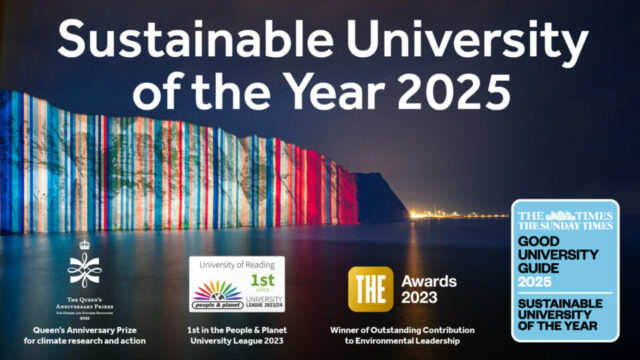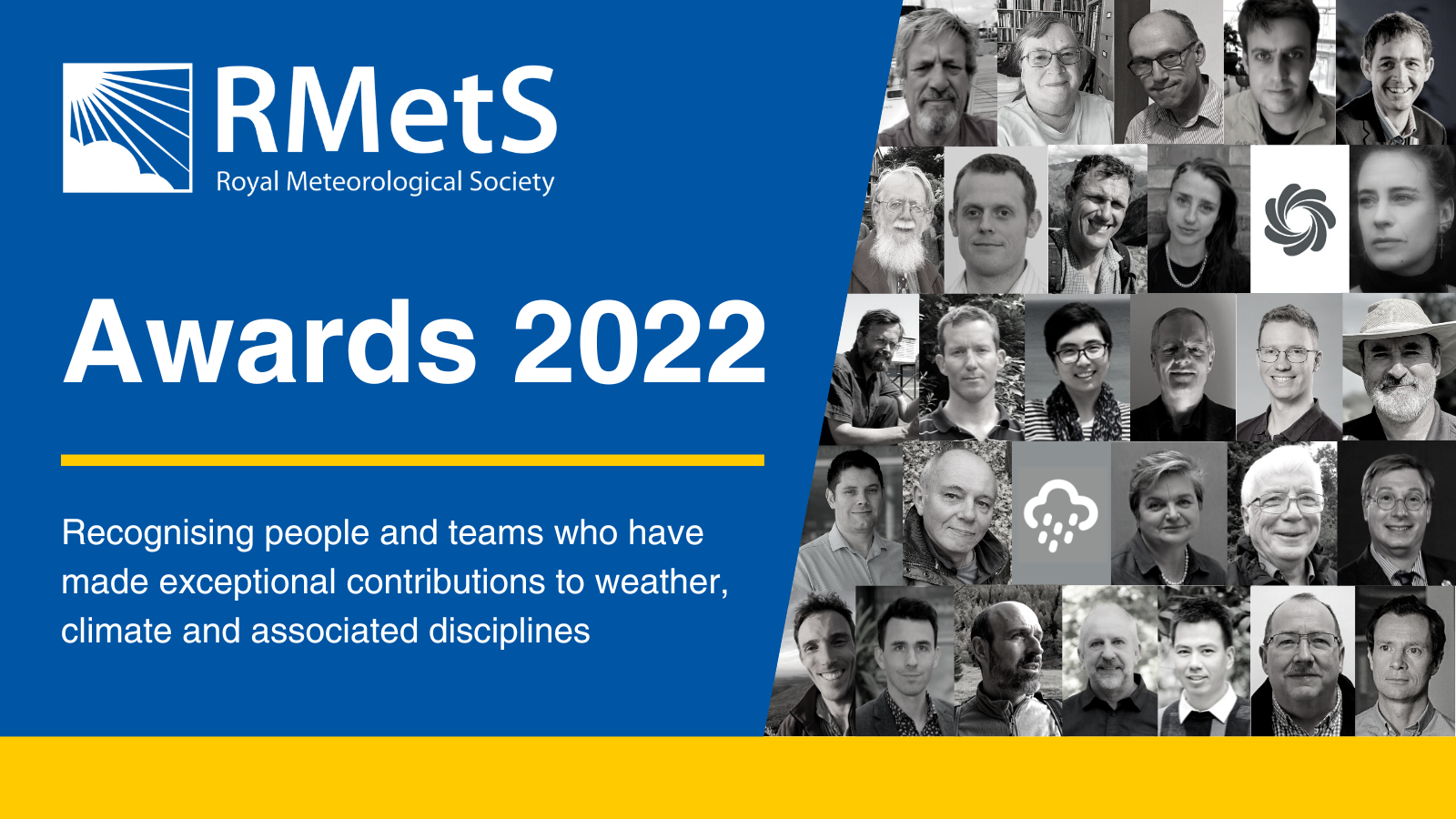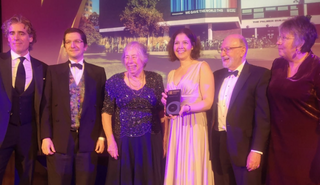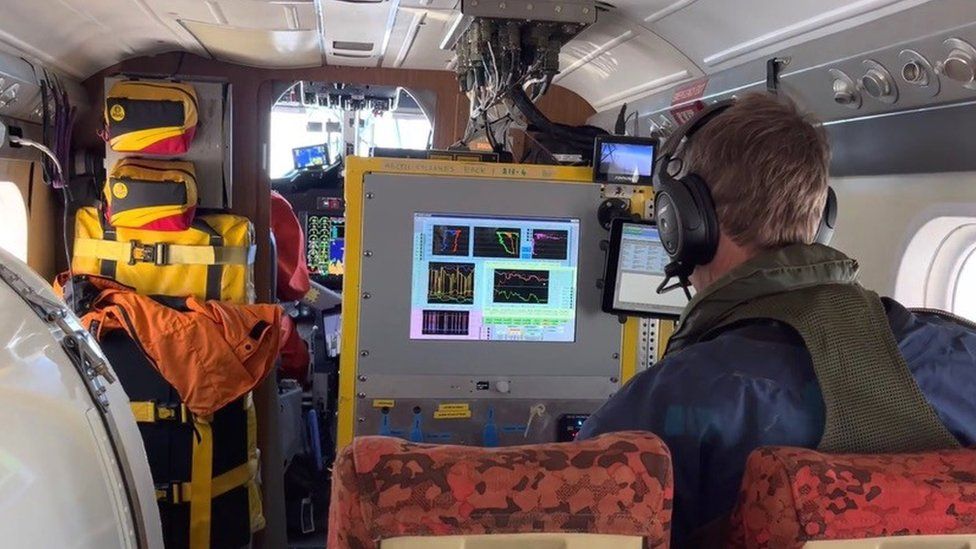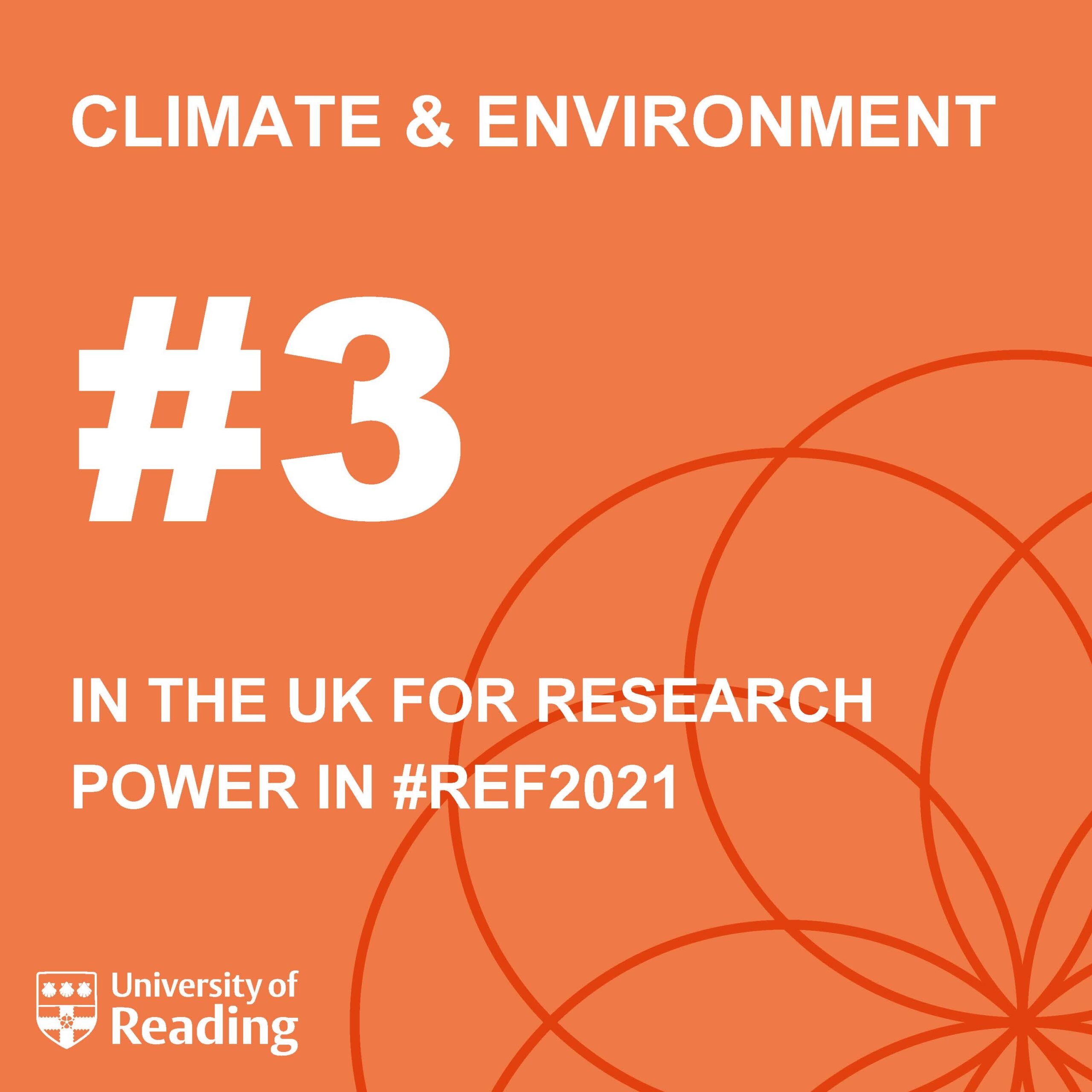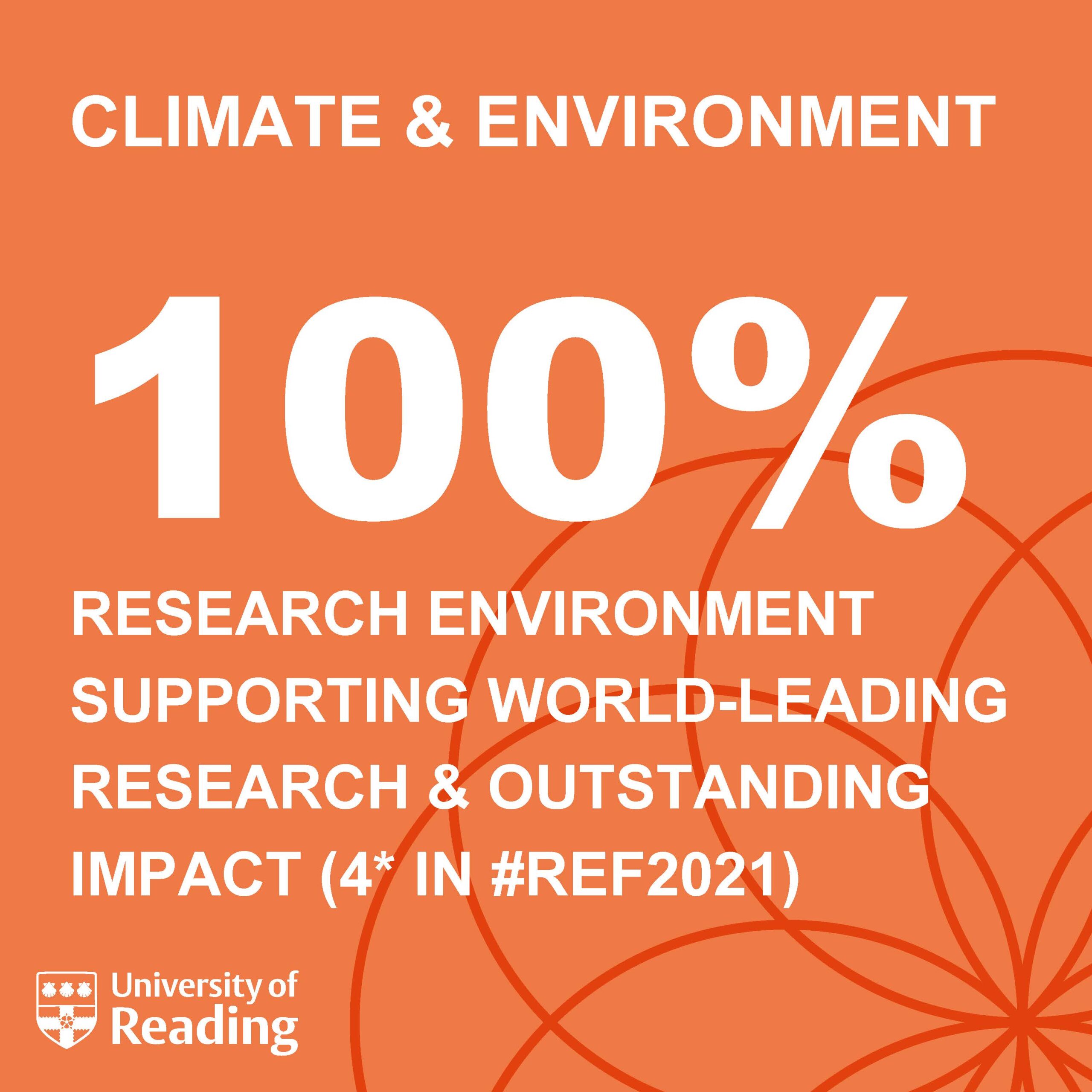News and events
Click the link for our seminar programmes
READ OUR LATEST RESEARCH BLOGS
Check out our latest departmental blogs:
LATEST RESEARCH NEWS
Nicolas Bellouin receives Institute of Physics 2024 Edward Appleton Medal and Prize
- The award was for pioneering use of satellite observations and simulations to quantify climate impacts of atmospheric particles on Earth’s climate through advancing understanding of their interaction with sunlight, clouds and vegetation (Nicolas Bellouin’s website)
Extreme weather to strengthen rapidly over next two decades
- More new research involving Laura Wilcox highlights how three quarters of the global population can expect strong and rapid changes in extreme temperatures and rainfall in the next 20 years unless greenhouse gas emissions are cut dramatically.
2023 record heat from global warming and weather variations
- New research involving Laura Wilcox has found that the surge in global surface temperature in 2023 can be explained by the unusual weather patterns combined with the steady global warming caused by human activities
Staff recognised at 2024 Research Awards
- Thomas Wilder picked up an Early Career Research Output Prize for new insights into ocean circulation while Richard Allan was runner up in Public Engagement with Research for Inspiring action on climate change through engaging science
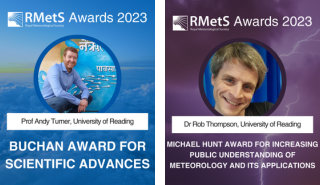
Top weather research awards for Reading climate science pair
- Andrew Turner received The Buchan Award for Scientific Advances and Rob Thompson received The Michael Hunt Award for Increasing Public Understanding of Meteorology and its Applications in the 2023 RMetS awards
Mike Lockwood made president of Royal Astronomical Society
- Mike Lockwood, our intrepid professor of Space Environmental Physics, becomes the new president of the Royal Astronomical Society
EMS Silver Medal 2024 for Sue Grimmond
- Our very own Sue Grimmond has picked up the European Meteorological Society Silver Medal for an exceptional scientific career, marked by pioneering contributions to the field of urban meteorology, leadership in the meteorological community, and impact in operations for weather and climate modelling.
Aerosol particle pollution may have increased cloud and offset global warming more than expected
- New research in Nature Geoscience used the volcanic plume from a Hawaii volcano as a laboratory to improve understanding of how tiny aerosol particles affect cloud
Extreme weather in net-zero world the focus of new research
- A new project led by Andrea Dittus is already improving understanding of what a net zero world will look like with reversal of European summer precipitation decline in a stabilizing climate
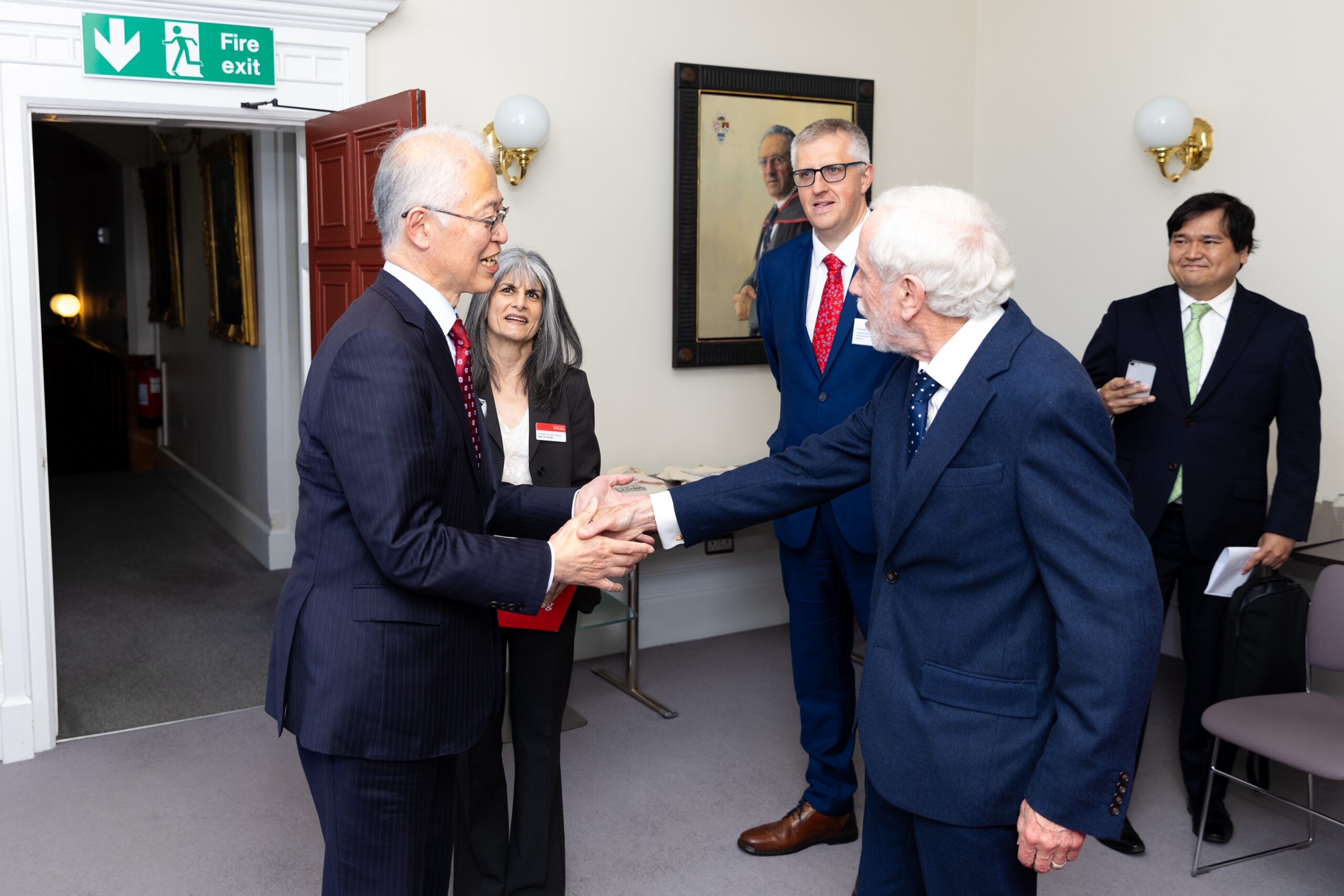 Above: Brian Hoskins is greeted by Ambassador Hayashi
Above: Brian Hoskins is greeted by Ambassador Hayashi
Brian Hoskins receives Japan Prize
- Sir Professor Brian Hoskins was awarded the Japan Prize for establishment of a scientific foundation for understanding and predicting extreme weather events
University of Reading tops sustainable universities league table
- The University of Reading has been ranked as the number one university in the UK in the latest People & Planet University League table and was recognised for managing carbon emissions, providing climate education resources and a sustainable food policy
University of Reading win THE award for Outstanding Contribution to Environmental Leadership
- University of Reading “Planet Partners” scoops the Times Higher Education award for leading collaboration on climate action and impact including world-leading scientific research and global policy impact, with a strong contribution from the department
Ex-Reading student helps ECMWF improve model
- Rebecca Emerton, previously an MMet and PhD student in the department, is now part of a team that strives to improve ECMWF’s weather model by looking for the causes of errors.
More wet and dry extremes
- New research from the department shows a growing severity of wet and dry extremes which inlcude more rapid onset “flash” droughts
Royal Meteorological Society Awards for our Scientists
- David Brawshaw receives the Adrian Gill Award, Ed Hawkins the Hugh Robert Mill Award, Bryan Lawrence the Award for Innovation in Development of Computational Models, Tools or Visualisation and Roger Brugge the Award for Outstanding Contribution to The Society or Profession. Congratulations to all award recipients (see full list)!
Warming stripes projected onto The White Cliffs of Dover as a stark climate change message
- The iconic climate stripes, created by our very own Ed Hawkins to depict progressive warming of climate, were projected onto The White Cliffs of Dover, The Tate Modern chimney and landmarks in Reading, the USA and Canada on Wednesday, 21 June, to mark Show Your Stripes Day.
Summer rain mystery to be investigated with balloon squadron
- Thorwald Stein leads research in the WesCon Observing the Evolving Structures of Turbulence project
Aviation turbulence strengthened as the world warmed
- Mark Prosser led work published in Geophysical Research Letters showing observed worsening of clear air turbulence
Met Office partnership lead appointed
- Professor Helen Dacre has been appointed as Met Office Joint Chair – a key role in the University’s partnership with the Met Office.
Climate ‘spiral’ threatens land carbon stores
- The world’s forests are losing their ability to absorb carbon due to increasingly ‘unstable’ conditions caused by humans activities according to a new study in Nature, with contributions from our very own Patrick McGuire
Tropical storms signalled by atmospheric waves
- Identifying westward-moving atmospheric wave disturbances near the equator can help to improve forecasts of destructive tropical cyclones up to 2 weeks ahead according to new research from the Meteorology department
Greener flights work wins science prize at Times Higher Education Awards
- Work by Paul Williams and Nancy Nichols as part of a project to cut carbon emissions by using hard maths to better direct aircraft across the Atlantic has been named as the THE awards best UK science project of 2022
Take climate-changing aerosols seriously, scientists say
- Scientists, including Laura Wilcox from the department and NCAS Climate, have called for a more heightened consideration of the the uncertainties related to particle aerosol pollution in climate risk assessment
Salt more important than temperatures in sea ice formation
- New research in Science Advances from the department and University of Gothenburg is improving understanding of sea ice formation
Powerful hurricanes get second wind in Europe
- New research led by Elliott Sainsbury has found that stronger hurricanes that are reenergised by jet stream winds are twice as likely to cross the Atlantic and wreak havoc in Europe than weaker ones
Cocoa and climate expertise showcased to Nicaragua diplomats
Running Out Of Time Relay 2022
- Students, staff and the local community turned up on campus to show their support for Professor Ed Hawkins and Professor Peter Miskell who took part in the ‘Running Out Of Time’ Relay on Friday 7 October 2022; helping to deliver a message of climate action as part of the University of Reading’s contributions to tackle human-caused climate change
Reading in top 200 Universities globally and 4th best for Atmospheric Sciences
- The department has helped the University of Reading into the Times Higher Education top 200 Universities 2023 list and scored as 4th best for Atmospheric Sciences in the 2022 Shanghi Rankins
Continued and strenthened partnership with Met Office will further climate research
- The department is central to a renewed and strengthened Met Office Academic Partnership (MOAP) as part of an expanded initiative to understand the increasing impacts of extreme weather and climate change.
Fluctuations in Atlantic weather patterns found to impact India’s food and water supply
- New research led by Kieran Hunt has for the first time indentified a causal link between the North Atlantic Oscillation and winter precipitation over the Western Himalaya, of great importance to the year-round water supply for Indian agriculture
Department scientist wins prestigious American Meteorological Society Award
- Our very own Jonathan Gregory is the deserved 2023 recipient of the Syukuro Manabe Climate Research Award for outstanding contributions to the fundamental understanding of Earth’s climate system.
Climate Scientists Chase Arctic Cyclones
- Researchers from the University of Reading are involved in an important field campaign to understand how summertime Arctic cyclones affect, and are affected by, sea ice and their role in the rapidly changing climate
World leading research environment
- Our research environment is classified as world leading and we rank 3rd in the country for research power across Earth Systems and Environmental Sciences in the latest Research Excellence Framework assessment (REF2021)
The Meteorology building has been renamed the Hoskins Building
- Our department building has been named after Professor Sir Brian Hoskins. A member of the University of Reading since 1971, including as Head of the Department of Meteorology between 1990-96, Sir Brian began the Department’s growth into the major global force it is today. It was under his leadership that the conception, planning and construction of the Meteorology Building that will bear his name began.
Hunga Tonga volcano created biggest explosion on record
- Department scientists contributed to research published in the journal Science showing the Hunga Tonga volcano in the South Pacific created an explosion bigger than anything else ever recorded by modern geophysical equipment.
Ozone may be heating the planet more than we realise
- Important new research involving Associate Professor Michaela Hegglin has revealed that changes to ozone levels in the upper and lower atmosphere were responsible for almost a third of the warming seen in ocean waters bordering Antarctica in the second half of the 20th century.
Rescued Victorian rainfall data smashes former records
- Professor Ed Hawkins, Rainfall Rescue Project Lead, said: “I am still blown away by the response this project got from the public. Transcribing the records required around 100 million keystrokes, yet what I thought would take several months was completed in a matter of days.”
Department’s climate change research helps secure Queen’s Anniversary Prize
- The University of Reading was presented with a prestigious Queen’s Anniversary Prize in a ceremony at St James’s Palace in London attended by joint head of the Department, Professor Joy Singarayer.
How does electric charge in cloud affect rain?
- New research led by Department of Meteorology professors advances understanding of how electric charge influences cloud drop growth that can ultimately lead to rainfall
New home for ECMWF on University of Reading campus
- The European Centre for Medium-range Weather Forecasts (ECMWF) will move to a new state-of-the-art, energy-efficient headquarters on the University of Reading campus, joining us to create the world’s largest cluster of weather and climate research and operational forecasting.
New maps of future climate risk in the UK
- Future risks from climate change affecting the UK have been mapped in a new interactive website as part of work led by Prof. Nigel Arnell
Professor Keith Shine elected as prestigious American Geophysical Union Fellow
New research suggests climate simulations may underestimate the impact of climate change
- Reading researchers, led by Dr Christopher O’Reilly, have found that climate models may be underestimating the impact climate change will have on the UK and North America due to a missing element – wind variability.
Tropical crops could suffer as climate change brings longer dry spells
- Research led by Dr Caroline Wainwright investigates how tropical wet and dry seasons change as climate warms
Climate scientists play leading role in the latest Intergovernmental Panel on Climate Change (IPCC)
- The report, which warns that damaging effects of climate change are already being seen across the globe and featured prominently in the COP26 climate negotiations in Glasgow
